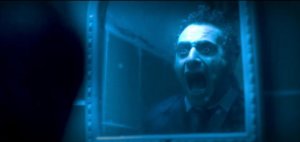Review: Baskin (2015) ★★★
There is a fine line between what academics and horror aficionados would deem “high-art” horror (though many will claim that no such thing exists) and your everyday, garden-variety “low-art” horror. The distinction is not always clear, as the genre relies on tried-and-true formulas, as well as a fundamental objective to evoke a specific emotional response. There are other genres that do the same, but in different ways, such as tear-jerker dramas or gross-out comedies, however almost no one would confuse the latter two with high-art. A perfect example of this eternal limbo is Drew Goddard’s The Cabin in the Woods (2012), an exceptionally crafted horror film about horror films. On the surface, it is a rather banal story about young people being picked off by monsters, but it is actually a brilliant sampling of self-reflexivity, a love letter to the genre of which it is part. Unfortunately, outside of the realm of postmodern cinema, it is difficult to mix low and high art without tumbling back into the former; in the case of Can Evrenol’s surreal horror film, Baskin, the two forms intertwine with mixed results.
The plot focuses on five police officers and their attempt to respond to an emergency call at a mysterious place called Inceagac. While on the way, the officers witness several strange occurrences, including a naked man running in front of their van and dozens of frogs appearing on the road. Suddenly, while in the middle of the discussion about what they have seen, the group runs into a man standing in the middle of the road, and the van swerves off into a nearby embankment. From here, the youngest of the group, Arda (Gorkem Kasal), is plagued by disturbing dreams that seem to interrupt reality. However, once the group reaches their destination, they are all confronted by hellish sights that threaten their sanity and their lives.
Baskin accomplishes more than most horror films insofar as it is genuinely scary. While this can mostly be attributed to a few jarring sequences featuring bloody, disfigured bodies taking part in repulsive acts, the film as a whole is still genuinely frightening. Unfortunately, a good horror film cannot rely on disturbing imagery alone, as Silent Hill (2006) has already proven. There needs to be a sense of tension and preferably a depleting sense of hope for resolution. Baskin technically does both of these things, but by the time the scarier elements of the story are introduced, we are bombarded with every hellish incarnation that the filmmakers could imagine. Suddenly, it becomes a fun house of horrors that gets a bit repetitive, to the point that things we found frightening only minutes before quickly feel overused, thus losing their intended effect.

What separates Baskin even more from other horror films, apart from a few surprisingly graphic scenes, is that it attempts to take the narrative in a more surreal, less logical direction. In theory, this would be a good thing, but the relative normalcy of the hellish imagery (particularly the principal antagonist) does not fit particularly well with the strange, inexplicable nightmare sequences. It feels as though the film was split into two halves, directed by two different people with two different visions; on the one hand, Baskin is a generic, albeit graphic horror film about hell and demons and cults, and on the other, it is a story about a young police officer, haunted by his past and afraid of losing his mind. The two plot lines are meant to compliment one another, but the difference in tone and overall quality make them uneven bedfellows.
All in all, Baskin is definitely entertaining and scary, and will be pleasing for horror fans who prefer things to be a bit darker and disturbing; though there are glimmers of higher aspirations throughout the film, it ultimately succumbs to B-movie tropes and an over-saturation of all things demonic. Nonetheless, it is certainly worth a watch, particularly for die-hard fans of horror.
Baskin is available to rent or purchase via Amazon here.
Rating: ★★★ out of 5

